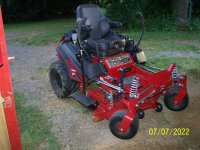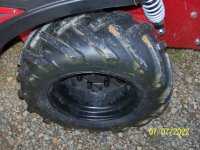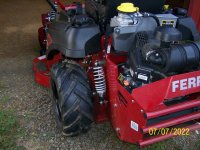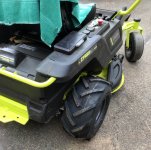As far as ATV tires holding up to FEL use... apparently!

I had those concerns when i was deciding what front tire to put on my 6100. It had 20.5" trailer tires on the front when i got it, which was basically making it 2wd in terms of how useless they were for traction. I considered the more mainstream options but decided the absolute biggest factor i was after, was the least tread touching the ground. However much weight is on a tire, divided by how much rubber is actually touching the ground, gives you your 'surface pressure'. The more surface pressure, the more traction (at least on a hard surface). It also means more leaving marks aka 'turf damage' but i don't have turf and the ground here is extremely hard. The ATV tires i picked actually had less tread touching the ground at a time than R1s, which i figured would give the best shot of traction. So far I've been pleased with that aspect. As far as their weight capacity... I was 50/50 on whether it was going to work or not. But im constantly maxing out the stock hydraulics of my loader and have had no issues whatsoever. The worst things I've done to them was pull ridiculously heavy things uphill, in reverse, while trying to turn. Like a loaded 18ft trailer, and a John Deere 720. Both times the tractor was pushing backwards with the front tires hard enough to start lifting the rear end, so all ~1500 lbs of the tractor plus whatever weight was on the loader, and attempting to turn was having the tire flex sideways under the rim a good 2-3 inches. I thought for sure they were going to pop at that point, but they didn't and I haven't worried about it since.
I hate to write too many essays in one thread but weight capacity of tires mostly has to do with heat buildup. Tires usually have max amounts of weight, pressure, and speed written on them, but not together in such a way that the relationship between them is explained. Weight causes sidewall flex, which only happens
under the wheel. So as a tire rolls the sidewall is flexing back and forth as it passes under the wheel. That internal friction, plus whatever friction is being created between the tire and the ground, causes heat buildup in the tire. The 'proper' air pressure in a car is mostly derived from the amount of pressure that will keep the sidewall in a 'happy' amount of flex, while not ballooning the tread outward such that it wears unevenly and making it ride rough from excessive pressure. So you run the pressure that lifts the weight enough that the sidewall doesn't flex too much. There are videos online of people popping tires with sheer air pressure, and even the flimsy lawn tractor tires get up near 100psi before popping, and car/truck tires can get well over 200psi. In a car, speed can cause the heat to accumulate faster than it dissipates, eventually leading to tire failure. On a tractor, speed is not a factor. The only way you'll overheat a tractor tire is by rolling on it nearly flat for a long time (too much flexing, and since tractor tires can be REALLY old they'll often split at the sidewalls at this point) , or spinning it on the ground for a long time. Both rare. So even if we're over the 'weight capacity' we're not spinning it fast enough to overheat it from internal friction, and we're not putting enough pressure in it to pop it, and we're not doing tractor burnouts.. so it's fine! The limits on tires are basically 'this is the max weight the tire can hold at the max speed and pressure listed elsewhere on the tire'. If you go slower, you can get away with more weight and less pressure.





